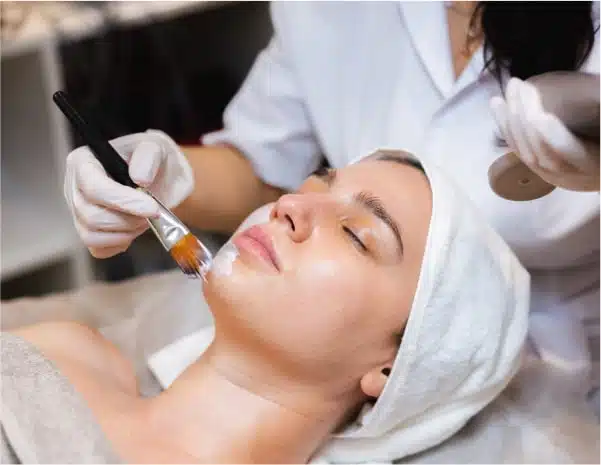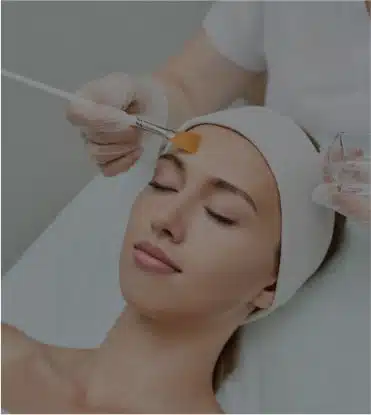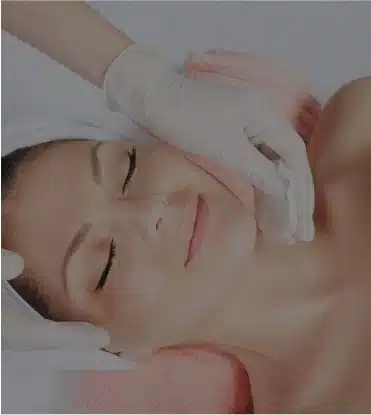Are Chemical Peels
Right For You?
The following qualities, among others, are present in the top candidates for chemical peels:
-
Acne &
Acne Scarring -
Fine Lines
& Wrinkles - Hyperpigmentation
Benefits of Chemical Peels

Balances skin
texture

Minimizes
discoloration

Improves tone
& texture
Pricing and Treatment Details

Our standard price for a regular chemical peel is $175 a session. The procedure is quick and done within 15-30 minutes. Our aesthetician will provide tips and post-care instructions. There is no downtime, and you can go right back to your day after the treatment. Your skin will peel and improve over subsequent days.


How Often Should You Get
A Chemical Peel?
Generally, chemical peels may be repeated every 4-6 weeks, depending on the type of chemical used. It’s important to consult with an esthetician who can assess your skin type and give you the best advice.
FAQs
They are generally safe when performed by a qualified professional. With proper care and attention, chemical peels can be an excellent tool for achieving smoother, brighter, and more youthful-looking skin. It is important to note that different types of chemical peels exist, ranging from superficial to deep, and each carries varying degrees of risk. Therefore, it is crucial to have a thorough consultation with your dermatologist to determine which type of peel suits your skin and ensure that the treatment is carried out safely and controlled.
A chemical peel involves applying a chemical solution to the skin that causes exfoliation and removes dead skin cells. While there may be some discomfort during the procedure, most patients report mild to moderate pain that is tolerable. Additionally, the severity of the discomfort can vary depending on the strength of the chemical solution used and the sensitivity of the patient’s skin. Chemical peels can be an excellent way to achieve smoother and brighter skin despite discomfort.
Yes, chemical peels can be a highly effective way to improve the appearance of your skin. By removing the top layer of dead skin cells, chemical peels can reduce fine lines and wrinkles, even out skin tone, and improve the texture of your skin. However, it’s important to choose the right type of chemical peel for your skin and to have the treatment done by a trained professional to avoid any potential adverse reactions.
The length of time that the effects of a chemical peel last can vary depending on several factors, including the type of peel used and the individual’s skin type and lifestyle. Typically, a superficial peel lasts anywhere from 1-2 months, while a medium-depth peel can produce results up to 6 months. A deep peel has the potential to provide results that can last up to a year or more.
Opt for a lightweight, fragrance-free moisturizer or a soothing ointment after a chemical peel. Look for aloe vera, chamomile, and Centella Asiatica that can hydrate and calm irritated skin. Avoid harsh exfoliants, retinol, and benzoyl peroxide for several days after peeling. Instead, stick to a gentle skincare routine focused on nourishing your skin’s recovery process.
Depending on the type and strength of the peel, you may experience some redness, dryness, and flaking of the skin. It’s essential to follow the aftercare instructions provided by your skincare professional to ensure optimal healing and results. Avoiding direct sunlight and wearing sunscreen to protect your skin from further damage are also important. Over the next few days, you may notice your skin looking and feeling smoother, brighter, and even-toned. However, it’s important to note that the full results of the peel may take several weeks to reveal themselves fully.
Chemical peels can be a helpful skincare treatment for addressing issues like acne, uneven skin tone, and sun damage. However, taking extra caution when considering any new skincare regimen when pregnant is essential. While there isn’t definitive evidence that chemical peels are harmful during pregnancy, most dermatologists recommend avoiding them entirely during this time. Instead, focus on gentle skincare options that won’t risk your developing baby, and consult your healthcare provider before trying new treatments.
Chemical peels are a popular skin treatment because they improve skin texture and tone. However, chemical peels are not suitable for everyone. Individuals with sensitive skin, certain medical conditions, or those with darker skin tones may not be eligible candidates for this procedure. Additionally, it is important to seek the advice of a qualified skincare professional before undergoing a chemical peel to ensure that it is the right choice for your skin type and concerns.
Before undergoing any chemical peel, it is crucial to consult a dermatologist and disclose any medication or skin care products you are currently using. Avoid sun exposure, stop using benzoyl peroxide or retinoids, and perform a patch test to check for any allergic reactions. In conclusion, chemical peels can transform your skin, but it is essential to take the time to prepare accordingly for optimal results.
During the treatment, you may experience a burning sensation or redness on your skin that lasts several days. Additionally, you may also notice peeling or flaking of the skin. These symptoms are usually temporary and manageable with proper skincare. However, you must consult a professional dermatologist before undergoing any cosmetic procedure to ensure you’re well informed about the treatment and its potential side effects.
Book Your Consultation
Schedule a consultation today if you’re interested in learning more about chemical peels or other cosmetic surgery procedures.
BOOK NOWYou May Also Be Interested In






